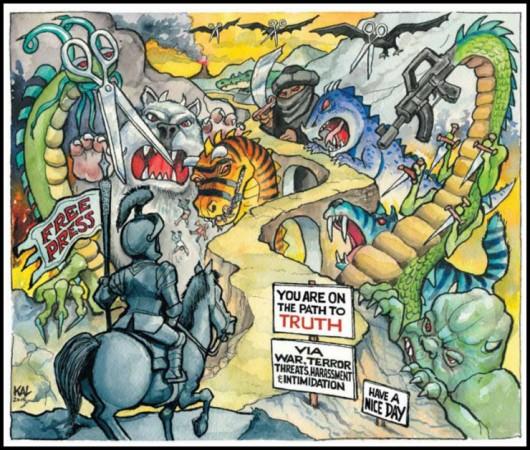
Only one in seven people around the globe live in a country that guarantees press freedom, according to a recent study published ahead of the World Press Freedom Day 2015.
Globally, journalists are facing increasing restrictions, including grave threat to their lives that has affected the free flow of news and information, the report, titled Freedom of the Press, noted. It also suggested that in year 2014, press freedom saw its sharpest decline in the last 10 years.
The study published by Freedom House assessed the degree of freedom in 199 countries and found that only 14% of the world population truly enjoys any press freedom.
Similarly the report noted that while 42% of the world population lived in a country with "partly free press" and 44% lived in "not free" environments.
Two of the world's most populous countries, China and India, that account for over a third of the world's population, have fared poorly when it comes to press freedom.
According to the study, China had a "not free" status, as it has increasingly restricted press freedom. The best example of China's censorship includes its gag orders in Tibet and Xinjiang
regions.
India, on the other hand, is only "partly free."
"India, the world's largest democracy, achieved another peaceful transfer of power through elections in 2014, yet its press freedom score declined to its lowest level in over a decade due to an increase in the use of defamation cases against journalists and a higher level of self-censorship caused by editorial interference from media owners in the lead-up to the elections," the study claimed.
Also, Thailand, Ecuador, Turkey, Hong Kong, Honduras, Hungary and Serbia have topped the list for being the countries where press freedom has seen its sharpest decline.
The most dangerous places for journalists include parts of Syria and Iraq controlled by the Islamic State (Isis), besides states in northeastern Nigeria where Boko Haram is active, Egypt's restive Sinai Peninsula and Libya.
In Mexico, Honduras and other Central American countries, powerful gangs and government authorities continue to use intimation and violence against journalists.
The report also included a list of world's 10 worst-rated countries and territories, such as Belarus, Crimea, Cuba, Equatorial Guinea, Eritrea, Iran, North Korea, Syria, Turkmenistan and Uzbekistan, where independent media is either non-existent or barely able to operate.













